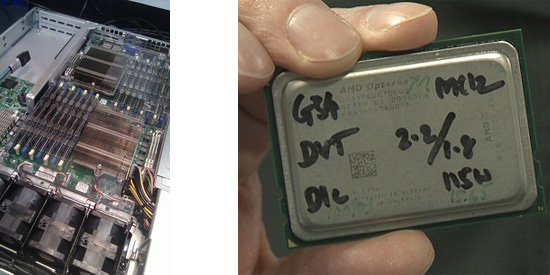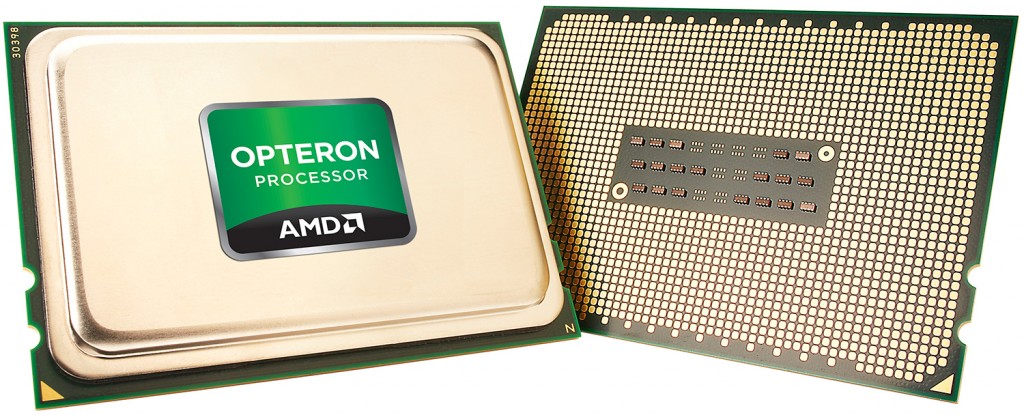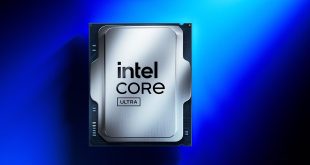Advanced Micro Devices is working on a server-class system-on-chip (SoC) for Facebook. While not a lot of details are known about the microprocessor today, if Facebook adopts the chip for its datacentres, it will be a major revenue opportunity for AMD.
As Facebook’s infrastructure has scaled, the company ran into situation when it needed custom hardware to meet the needs of its vast datacentres. In a bid to develop such hardware, Facebook established Open Compute Project (OCP) and teamed up with numerous industry leaders in hardware design. The OCP develops various components, but so far the industry group has not really created any final specification of a complete server platform.
While elements of the OCP are used by Facebook and other participants to build new datacentres, in many cases hyper-scale datacentres continue to use a lot of custom tailor-made hardware, which includes microprocessors. It is not a secret that companies like Facebook, Amazon Web Services and other buy optimized versions of chips from Intel and AMD. However, it is also known that both chipmakers are designing full-custom central processing units (CPUs) for large clients. Apparently, this is exactly what AMD is doing for Facebook.
According to a source with knowledge of the project, AMD is developing a custom Opteron server processor for Facebook. Few details are known about the chip today. What is known is that it is based on 64-bit ARMv8-A architecture and is designed by AMD’s Enterprise Embedded and Semi-Custom (EESC) business group.
It is still a mystery whether the ARM-based system-on-chip is powered by AMD’s own K12 high-performance core due in 2016 or ARM’s off-the-shelf Cortex-A57 or A72 cores. However, keeping in mind that this is going to be a full-custom CPU, expect it to feature special-purpose intellectual property from Facebook (e.g., accelerators, instructions, links, etc.) custom I/O configuration and various other ways to tailor the SoC for Facebook’s workloads.
Since Facebook runs hundreds of thousands of servers, just one contract with this company could bring a significant amount of money to struggling AMD. Keeping in mind that Facebook pays for development of the SoC (which is a general term of AMD’s semi-custom business approach), the situation seems to be quite good for the Sunnyvale, California-based chip designer.
Nowadays AMD sells less than 2 per cent of the world’s server processors, whereas the lion’s share of such CPUs is shipped by Intel Corp. Several contracts with companies like Facebook could significantly improve the company’s positions and balance sheet.

AMD does not comment on future EESC projects, but over a number of months the company has implied on multiple occasions that its semi-custom business was about to expand beyond video gaming market. At present, the main customers of EESC are Microsoft Corp. and Sony Corp., who buy system-on-chips for their Xbox One and PlayStation 4 consoles from AMD.
Discuss on our Facebook page, HERE.
KitGuru Says: While it is nice to see that AMD’s server processors are still needed by the market, do not expect financial breakthroughs for the company in the short-term future. Long-term success of AMD depends on success of Zen and K12 micro-architectures, but we have no idea about their potential. We do know that Jim Keller, the man in charge of development of both processing technologies, is also behind Apple’s Cyclone cores, the world’s most powerful ARMv8-A cores that even manage to challenge Intel’s “Silvermont”. Nonetheless, this does not automatically mean that the K12 will be a triumph. Still, if Facebook-specific SoC is indeed K12-based, then the contract between AMD and the Internet giant could be an early indicator of renaissance for the chip designer.
 KitGuru KitGuru.net – Tech News | Hardware News | Hardware Reviews | IOS | Mobile | Gaming | Graphics Cards
KitGuru KitGuru.net – Tech News | Hardware News | Hardware Reviews | IOS | Mobile | Gaming | Graphics Cards




I hope it will go well. I don’t care about this but if it can bring money in AMD and this lead to finally see a good CPU on the market I wish them good luck.
We really need to get back in those days when AMD was really was competitive against intel, when each new CPU generation from each brand was better and better and the prices kept at bay.
Well Intel CPUs are good CPUs. However I agree, there is pretty much no competiton to intel, at least on the gaming side, which has led to minimal improvements in the new gen of CPUs, sure a lot changes but the performance increase is ridiculously small. Plannign to build a new PC next year when I am over Japan for a year, hoping by then the 6th Gen is out and actually is something to shout about..
Need more competition on the GPU and CPU market. No competition is bad for everyone
Exactly, intel doesn’t care to push the performance because nobody really compete with them especially above i5.
Plus the pricing above i5 is ridiculous for the extra performance you get, which could be no issue if amd had something at this category.
At the recent Open Compute Project Summit 2015, Facebook already announced their latest servers were using Intel’s new Xeon D chips: http://www.datacenterknowledge.com/archives/2015/03/13/latest-facebook-server-based-on-intels-new-xeon-soc/ And besides, the older Intel Avoton servers chips have already been deployed. Video from the Open Compute Project Summit 2015 here: https://www.youtube.com/watch?v=6QBrRT0VpgY however Facebook did not mention any AMD servers at all on their current and future projects. Meanwhile at AMD’s booth: https://lh3.googleusercontent.com/-5C5ftI3PrQ0/VQCtGOOU6oI/AAAAAAAAE4g/_dGIHxq7h9I/w1205-h678-no/8YDf6.jpg looks like Seattle is just going to be used for storage server function only (and after checking those server vendors’ websites, seems that these boards have not yet been launched). ARM servers are still in their infancy…
♥♥♥♥♥get $86 per hr@ae23:
Going Here you
Can Find Out,,,,
►►► http://WorkOnlinePlus.uk/live1/position40…
Software also needs to push the envelope since there are very few software offerings that are CPU bound. As for gaming there is a handful that are currently CPU bound. Once DirectX12 becomes mainstream the CPU will become irrelevant as more of the workload is put on the GPU. Theoretically, 3 or 4 year old CPUs will be more than enough to max out games assuming you have a 390X or Titan X to try and stay ahead of game developers with what they push onto the GPU.
Hopefully, Intel will reallocate some of their mobile contra revenue to the game developers so they will still try to push more onto the CPU. If not, AMD will be able to sell off any leftover CPUs from the last few years as cutting edge CPUs won’t be needed for DirectX 12. Not to mention, APUs and IPUs will become much more relevant for upper mid range gaming. For AMD immediately and Intel once they get serious about integrated graphics. Which they appear to be doing so with this years product launches.
this too, I have a six core phenom II and I hardly see more than 50% use in many cases.
Last time I remember using 100% was when I did some 3d renders for my Bachelor of Arts.
Well that rather depends on the gpu, settings, and that whole lot mate. Its hard to judge a cpu bottleneck without the whole picture. But its a real thing going on. If you dont believe that, believe mantle and directx.
Long story kept short and simple: The thing is its not how much cpu time is used in gaming that is important, its how fast the cpu “responds to the gpu” (wait time). Its what we call overhead, and isnt as easy to monitor with taskmgr.exe
Just keep that in mind 🙂
oh yes I do, I was talking for general use.
For example I work a lot with adobe suite and in many cases I have the system to use only 1 core at work while it could use all the cores and get the job done faster (e.g. exporting PDF with many pages from inDesign).
It is stupid because my girlfriend’s pc with i3 can do it faster while in raw power is half my phenom.
Yeah this world could (still) use some more multitreading support indeed..
Note the word developing in other words there not using AMD yet. These custom chips will replace the ones facebook are using now.
Did you watch the entire video I’ve posted? That was just from last week: http://www.opencompute.org/community/events/summit/ocp-us-summit-2015/ and Facebook did not mention any projects nor any collaboration with AMD at all (on their current and future server hardware). Currently Facebook is collaborating with Intel on all their server hardware. That is the problem with this article…
You know as well as I do that all this “ARM Server” fluff is intended feed kool-aid to the venture capitalists (AKA “The suckers that make the monthly paycheck”).
Intel will clearly bomb the price of Xeon-D and Denverton the moment any ARM server parts appear so ARM Server investors are left selling $20 parts instead of the $200 market they were promised… Result=Poorhouse !
As an indication, the latest ‘ARM Server” propaganda came from ARM’s “Vice President of Investor Relations”.
http://uk.reuters.com/article/2015/03/19/uk-arm-servers-share-idUKKBN0MF0CZ20150319
After all, a monthly paycheck is good, right ??? And the lights are still on!!:-)
By 2020? That is still a long time, and that “less than 1 percent now” is more like nearly zero percent actually. Just like AMD’s 15% by 2019: http://www.fudzilla.com/news/processors/37184-amd-hopes-15-of-servers-will-be-arm-based or ARM’s 10% by 2017: http://www.fool.com/investing/general/2015/03/17/facebook-incs-partnership-with-intel-corporation-b.aspx Also whatever happened to Windows Server for ARM: http://www.datacenterknowledge.com/archives/2014/10/27/report-microsoft-testing-windows-for-arm-servers/ ? At the moment ARM servers are quite a very tiny niche….